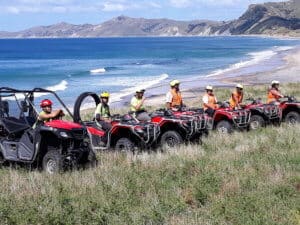
All in a day’s work-Primary Industry Certificate students on a cross country run in the hills overlooking Tolaga Bay
Back country hills around Uawa are the main classroom for a group of EIT students who also aim to make those hills their “office”.
The students are all from the Uawa district, where jobs are few and far between. But getting NZ Certificates in Agriculture -– one in Primary Industry Skills and one in vehicles, machinery and infrastructure (mainly fencing) – which will set them up for jobs in most land-based industries.
Jeffery Tidy says he has worked on farms around the district for 16 years, but needs the tickets if he wants to progress. But most of the students have not had serious jobs before and just want to get an opening into land based industry. Some want to do Level 4 courses as well.
Jasmine Rogers aims to follow in the footsteps of her father, who is stock manager at nearby Titirangi Station.
She wants to follow it with a course on lifestock breeding and farming to learn how to crutch, drench and graze stock as well.
Her classmates Shannon and Chanelle want to follow their fathers, brothers and uncles into the forestry industry.
The students have learned to safely use and maintain chainsaws, quad bikes and LUVs (light utility vehicles).
An important facet of their training is health and safety, which is crucial for those working with machinery, says their tutor Sam Sidney.
There is nothing the students love more than trekking around the hill country on quad bikes or LUVs but every day starts with a safety check.
They are well versed with vehicle maintenance, including oil, tyre, water and brake checks, says Sam. The same applies to chainsaws.
“We are very stringent about hazard control,” he says.
“They are taught how to measure risks and how to minimise or eliminate them.”
As opposed to other primary industry-based courses, EIT has designed this course to provide the basic skills for a wide variety of jobs.
As well as farming, quad bikes and LUVs are also used by the district council, Department of Conservation, forestry and beekeeping, says tutor Maewa Para, who designs the courses in conjunction with industry feedback.
Sam Sidney says most of the students were incredibly shy when they first started but have already gained enormous confidence.
Most of them had not been on farms before. Local farmers had provided the venues and a bit of work experience for them to learn on.
Jay Jay Raroa has discovered a new meaning to life since starting. He says he would probably have been in jail by now had he not done it.
He is hoping to get a job on a farm when it’s finished and is working hard to gain himself a good track record.
Coming from the area himself, and having a background in farming, Sam Sidney knows most of the students’ families, and has networks in the farming sector. Knowing each students’ aptitudes helps him when prospective employers approach him for workers.
